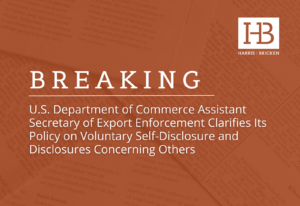Washington has a big problem. Simply stated, the nation’s government isn’t up to the task of serving the needs of the world’s largest economy. Though the problem isn’t just one of delays, it does manifest itself most clearly in the unacceptable waiting times to receive even the most basic of government services, across a range of agencies.
Consider the following:
- According to the State Department, as of March 24, wait times for routine passport applications are 10-13 weeks, with “expedited” applications taking 7-9 weeks. This means that a businessperson from the world’s largest economy might have to wait 4-5 months to travel overseas. Washington claims that it wants to help American exporters, and it has established considerable infrastructure for advancing that purpose, most notably in the form of the U.S. Commercial Service. However, the impossibility of traveling to meet potential customers on short notice hinders export activities, to mention just one negative consequence brought on by the delays. The State Department blames the mess on “unprecedented demand” for passports, but according to Secretary of State Blinken, “when demand for travel all but disappeared during the pandemic … the government let contractors go and reassigned staff that had been dedicated to handling passports.”
- The U.S. Patent and Trademark Office (USPTO) notes on its website that as of July 1, 2023, it was examining trademark applications that had been submitted between September 2, 2022 and September 16, 2022. In other words, it is taking 9-10 months for the U.S. trademark agency to take initial action on an application (registration will take a bit longer). As recently as 2020, the average time for first action was just three months. The current delays mean that it takes a trademark owner almost a year to find out if USPTO is going to register its trademark, with all of the adverse consequences that flow from that uncertainty. USPTO points to “record numbers” of applications in 2021, but even before the COVID-19 surge began, the number of applications received each year had more than doubled since the early 2000s.
- According to U.S. Citizenship and Immigration Services (USCIS), 80% of family-based applications to register permanent residence (green card) status handled by the Seattle Field Office are completed within 17.5 months. Leaving aside the fact that one of out of every five applications are not covered by that figure, it is now a matter of routine that new immigrants in the Seattle area have to wait 1½ years to have their green card applications approved. And to be clear, what is happening in Seattle is not an anomaly: The same figure for the Miami Field Office is 21 months.
Inordinate wait times for passports, green cards, and trademarks are annoying, but these delays also harm our economy and impact businesses and individuals in ways that are not quantifiable in dollars and cents. And the issues described above are just some of the symptoms of Washington’s dysfunction.
Though growing applications and insufficient staff are undoubtedly a part of the problem, so are policies and procedures that unnecessarily add to workloads. Take for example USPTO, which is clearly struggling. Does it make sense for the agency to waste its time insisting on clarifications that certain smokers’ products with perfectly legitimate uses won’t be used to consume marijuana?
As for green cards, why are they even needed in the first place for family-based immigrants? Considering that these folks already went through an application process to get the immigrant visa that allows them to enter the United States, why not just make the entry stamp that they get on their passport the functional equivalent of a green card (perhaps having the port of entry forward the information to a queue for a physical card to be printed at some point).
Relatively quick fixes (at least partial ones) could also be deployed to deal with passport delays. Not that long ago, you could add pages to a passport. No more. This means that a citizen who might otherwise be able to enjoy their passport’s full 10-year validity now needs to go through the entire application process once they use up all the pages. Bring back those extra pages (and just stop making problems worse).
Clearly, Washington needs to direct additional resources at improving our government services infrastructure, consistent with the fact that the country’s population is growing, and with it the demand for such services. At the same time, government agencies should be directed to streamline requirements wherever possible, in order to make more efficient use of their resources.

















